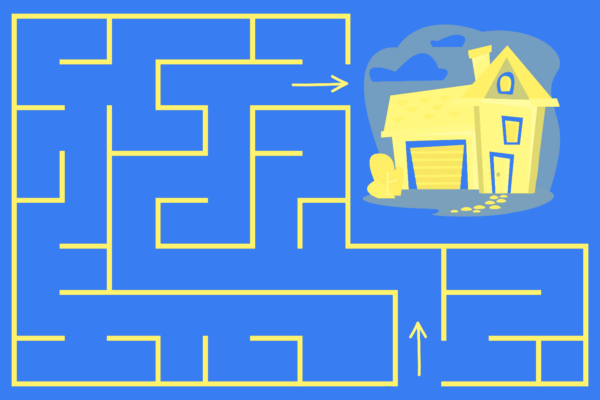
Rent vs. Buy: Are you Ready to Buy Your First Home?

Buying a home is a major life decision—are you ready? It’s one of those major questions that can only be answered by you, but we can help guide you part of the way! Here at Amplify, we want everyone to find the right loan for them, and we know it always looks a little different. It might mean applying today, and it might also look like getting a mortgage in two years.
To help you get started on your homebuying journey, we’d like to go over some of the most common factors to consider. If you’re curious about the financial impact of renting vs. buying, our calculator will be useful, too!
Renting: Pros and Cons
Many people tend to view renting negatively. They view it as “throwing away money” because you’re not building equity in a home.
Sometimes renting is the right choice!”
Ready for the truth? Sometimes renting is the right choice! If you’re planning on moving cities in a couple of years, or if you’re not ready to take on home maintenance, it may not make sense for you to buy a home. Renting can be a great way to have a home while also enjoying your freedom. Let’s consider the total costs of renting, beyond your monthly payment.
Here are some pros of renting:
- You have the freedom to move to a new neighborhood or even to a different city.
- The landlord covers the costs of most maintenance and repairs.
- No closing costs.
- If you’re responsible, you’ll get your deposit back.
- Your rent remains exactly the same each month.
- Don’t like it anymore? You can move pretty easily, depending on your lease.
Renting cons include:
- You’re not building any equity with your monthly payment. You’re essentially paying someone else’s mortgage.
- Limited ability to customize your living space.
- Depending on your apartment, you might have a bad layout or another inconvenient feature.
- You might not be able to change appliances or upgrade other features.
- The landlord may decide to sell the house or to stop renting, forcing you to move.
- Your rent may go up substantially, year over year.
Buying: Pros and Cons
There are so many benefits to owning a home. But that doesn’t mean everyone should own a home!
We want you to have all of the information you need to make a solid financial decision. As you review this information, consider your current finances, your current living situation, and any long-term plans you might have already made—like going back to school, having children, or changing careers. Here are just some of the pros and cons of owning a house.
Pros of owning your own home:
- Building equity over time. Instead of paying someone else’s mortgage, you’re paying yours—and that money can be leveraged for future projects and financial endeavors.
- The value of your home could go up. Unlike an apartment that you don’t own, a home’s increase in value means an increase in sale price, should you decide to sell.
- Tax benefits. Homeownership has incentives attached to it, like deducting your mortgage interest (as part of your itemized deductions).
- Customize your living space. Painting walls, knocking down doorways—whatever you want!
- Level-up your kitchen. Don’t like your appliances? Get new ones. Want a bigger sink? Make it happen!
- No more rent increases. While you might see an increase in property taxes or insurance, no more surprise increases from the landlord. And no security deposit!
Cons:
- You will have closing costs, an escrow deposit, and your down payment to think of, even before your first mortgage payment.
- Your mortgage payment comes with strings. You own the property, so if you can’t pay your mortgage, your house can be seized by the bank—regardless of how much equity you have in it already.
- Extra expenses beyond your mortgage. Because you’re the “landlord”, you’re also responsible for all of those things you didn’t pay for when renting: water heaters, electrical issues, plumbing, leaking roofs—and it can add up.
- The value of your home could go down, depending on where you live and how much you bought it for.
- Less flexibility to move. This is a big one. If you think you might move in the next few years, you’ll do all this work to buy a house only to turn around and sell it (which comes with more expenses, by the way).
- It’s possible to rush into a home purchase, only to experience regret. Before you buy, carefully consider all of the financial and lifestyle implications of owning a home.
Rent vs. Buy: Questions to Ask
Now that you have an understanding of the pros and cons of both renting and buying, hopefully you have a better idea of where you stand. Ready to continue on your homebuying journey? It’s time to start some research. Here are some questions to consider.
Do you have your finances in order?
Buying a house is a major financial commitment, and you want to be sure you are in good financial standing before you dive in.
The first thing to take a look at is your credit score. When you have a higher credit score, you more likely to secure a mortgage with a lower interest rate. As your credit score goes down, your interest rates will be greatly impacted. If your credit score isn’t optimal, consider taking some time to build good credit before applying for a mortgage. You might save some serious cash by taking another six months or a year to improve your score!
Next, determine if you have enough money saved up in case of emergency. It’s a good financial buffer to have 3-6 months’ worth of expenses saved in an emergency fund before you buy a house.
Can you afford the down payment and PMI?
Many prospective homeowners zero in on what their mortgage payments will be, without considering if they even have enough saved for the down payment. While you can purchase a home with a down payment as low as 3% of the cost, doing so adds private mortgage insurance (PMI) to your total monthly mortgage expense. PMI cost per month can vary depending on the home’s value and the lender. Our mortgage calculator can help you understand what PMI might add to your total monthly expense.
On top of your down payment, you’ll also need an escrow deposit, as well as closing costs. Escrow deposits are typically 1-2% of your home’s value, and closing costs are 1-3%.
Here’s an example of what that might mean:
You’ve purchased a $300,000 home. Let’s estimate a 5% down payment, add an escrow deposit of 2%, and add closing costs of 3%. That means in order to get the keys to your home, you may need up to $30,000.
Are you prepared for additional costs?
Being a homeowner costs much more than a down payment and a monthly mortgage payment. There are many expenses of homeownership that prospective buyers may fail to consider, including:
- Homeowners insurance
- Natural disaster insurance (including flood)
- Property taxes
- Trash pickup services
- Water and sewage services
- Pest control
- Landscaping and yard maintenance
- Homeowner’s Association (HOA) fees
- Wiring (cable, phone, internet)
- Security systems
Some of these are optional, but a lot of these extra expenses are not. Research what these services cost in your area, so you can be fully prepared before purchasing a house.
Are you ready to settle down?
Owning a house makes it a lot harder to be mobile and move around as you please. Think about your life situation and if you think it will change over the next few years. If so, buying a house may not be the best idea.
If you have a clear idea of where you are right now, and where you’d like to be, homeownership might be a good option for you. Remember: the value of your house goes up over time. If you don’t plan to stay in the house you purchase for at least a few years, your house’s value may not have increased enough to recover the fees you spent while purchasing it.
Understanding Taxes When Considering Homeownership
A benefit of homeownership is the potential for tax benefits. One such benefit is the mortgage interest deduction. Homeowners who itemize deductions may reduce their taxable income by deducting interest paid on a home mortgage. In addition, homeowners may also reduce their taxable income by deducting property taxes they pay on their homes. As a homeowner, you can experience these benefits and more, but there are other factors you must consider.
Recent tax law changes have lowered the amount of mortgage interest that can be deducted: previously, you could deduct the interest on up to $1 million of mortgage debt, and now you may only deduct interest on up to $750,000 of mortgage debt.
These tax benefits may also decrease year after year, because over time your monthly payment will go less towards interest and more towards your principal. Less interest paid means less mortgage interest that can be deducted in your taxes.
Rent vs. Buy: The Power is in Your Hands
Your finances, your future plans, your willingness to take on home maintenance—these are all factors you should be considering as you continue to look at renting vs buying. Ultimately, the decision is yours to make. You’re the only one who can know whether something is right for you!
At Amplify, we want everyone to find the financial products that make the most sense for them. We want everyone to have all of the tools available to them, so they can make smart financial decisions that set them up for success. If you’re ready to apply for a mortgage today, let us know! We’d love to help you start your homebuying journey.
Ready to apply for a mortgage today? Learn more about our mortgage loan options!



